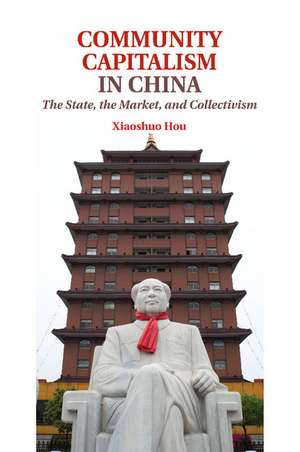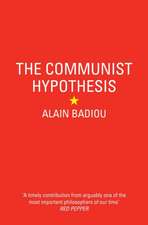Community Capitalism in China: The State, the Market, and Collectivism
Autor Xiaoshuo Houen Limba Engleză Paperback – 25 iun 2014
Preț: 354.65 lei
Nou
Puncte Express: 532
Preț estimativ în valută:
67.86€ • 70.85$ • 56.16£
67.86€ • 70.85$ • 56.16£
Carte tipărită la comandă
Livrare economică 04-18 aprilie
Preluare comenzi: 021 569.72.76
Specificații
ISBN-13: 9781107448780
ISBN-10: 1107448786
Pagini: 168
Ilustrații: 16 b/w illus. 6 maps 8 tables
Dimensiuni: 153 x 230 x 10 mm
Greutate: 0.25 kg
Editura: Cambridge University Press
Colecția Cambridge University Press
Locul publicării:New York, United States
ISBN-10: 1107448786
Pagini: 168
Ilustrații: 16 b/w illus. 6 maps 8 tables
Dimensiuni: 153 x 230 x 10 mm
Greutate: 0.25 kg
Editura: Cambridge University Press
Colecția Cambridge University Press
Locul publicării:New York, United States
Cuprins
Preface; 1. The curse revisited: the dynamics of social change in China; 2. Circle on the outside, square on the inside; 3. Socialism with Huaxi characteristics; 4. Capitalism reborn or collectivism rediscovered; 5. Back to the future: community capitalism and the search for alternatives.
Recenzii
'Community Capitalism in China is a welcome addition to the body of research on economic reform in China. It is a beautiful example of the ways in which grounded research can both illuminate eye-opening stories about transforming economies and also advance our theoretical understanding of the forces driving that transformation. Professor Hou also boldly steps beyond the tired state-versus-market mindset, offering a fresh view of how China's economy works.' Doug Guthrie, George Washington University School of Business
'The decollectivization of agriculture is constantly trumpeted as a key to China's economic growth under the reforms. Nevertheless, many of today's richest villages have actually retained or recreated collective forms of ownership. Professor Hou untangles this puzzle with an insightful and revealing analysis of how 'community capitalism' can allow a collective economy to thrive in contemporary China and in the world market.' Robert P. Weller, Boston University
'This volume is a well-supported case study of China's 'transitory economy'. By carefully analyzing three highly industrialized villages in China, Dr Hou's well-articulated argument offers a radically original concept that contributes significantly to the understanding of the complexity and reality of Chinese society in the post-Mao era.' Xiao-huang Yin, Occidental College
'Based on extensive fieldwork in three Chinese villages, Xiaoshuo Hou shows how local party leaders and villagers successfully promoted economic development and raised living standards during the era of reform.' Robert K. Schaffer, Pacific Affairs
'… a rich and comprehensive study of an original path of development introduced by some small-size communities in rural China in order to adapt to the new rules of state-controlled capitalism and the privatization of social welfare benefits.' Thomas Boutonnet, The China Journal
'The decollectivization of agriculture is constantly trumpeted as a key to China's economic growth under the reforms. Nevertheless, many of today's richest villages have actually retained or recreated collective forms of ownership. Professor Hou untangles this puzzle with an insightful and revealing analysis of how 'community capitalism' can allow a collective economy to thrive in contemporary China and in the world market.' Robert P. Weller, Boston University
'This volume is a well-supported case study of China's 'transitory economy'. By carefully analyzing three highly industrialized villages in China, Dr Hou's well-articulated argument offers a radically original concept that contributes significantly to the understanding of the complexity and reality of Chinese society in the post-Mao era.' Xiao-huang Yin, Occidental College
'Based on extensive fieldwork in three Chinese villages, Xiaoshuo Hou shows how local party leaders and villagers successfully promoted economic development and raised living standards during the era of reform.' Robert K. Schaffer, Pacific Affairs
'… a rich and comprehensive study of an original path of development introduced by some small-size communities in rural China in order to adapt to the new rules of state-controlled capitalism and the privatization of social welfare benefits.' Thomas Boutonnet, The China Journal
Notă biografică
Descriere
Hou offers a 'both/and' perspective of the state, market, capitalism and communism by examining the local institutional innovation in China.














